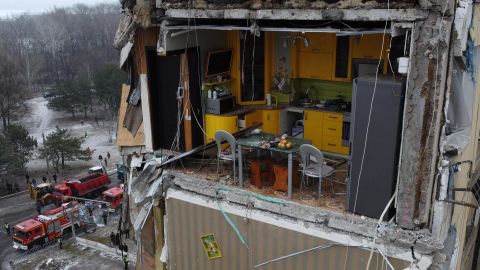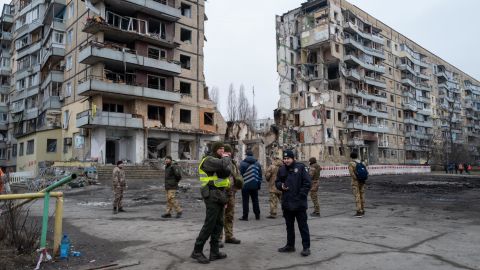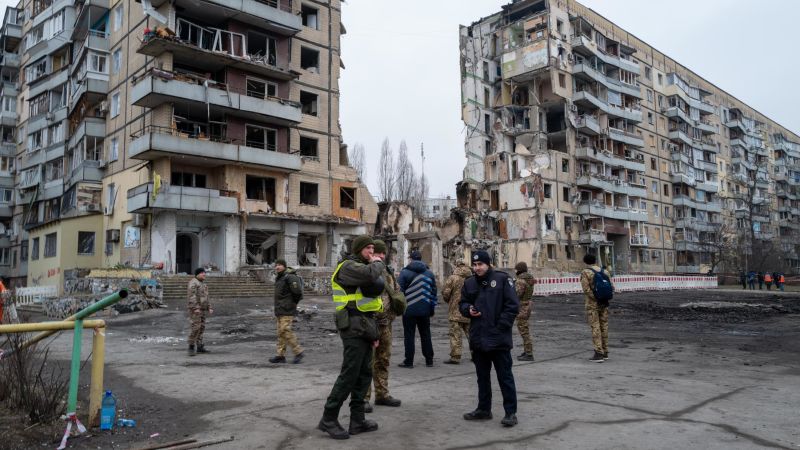Editor’s Note: Michael Bociurkiw (@WorldAffairsPro) is a global affairs analyst currently based in Odesa. He is a senior fellow at the Atlantic Council and a former spokesperson for the Organization for Security and Cooperation in Europe. He is a regular contributor to CNN Opinion. The opinions expressed in this commentary are his own. View more opinion at CNN.
Odesa
CNN
—
As Russia’s full-scale invasion of Ukraine approaches the one year mark, the bombing of a residential building in Dnipro on Saturday should not be seen as simply another red line crossed by the Kremlin.
What makes the Dnipro attack particularly repulsive is that it struck in the heart of a city that had been regarded as a safe haven for internally displaced people (IDPs) since the outbreak of hostilities between Ukraine and Russia back in 2014.
With a warhead of nearly one metric ton, it created a scene of destruction described by some in Dnipro as “hell.” It killed at least 45 people, including five children, with dozens more missing.
The shock from this strike could very well create a second generation of IDPs. Which could, in turn, place additional strain on already congested safe havens such as Lviv in western Ukraine.
Already, Ukrainian President Volodymyr Zelensky has called the attack a “war crime.” It’s not hard to see why.
The cruise missile that hit the Dnipro apartment building, Ukrainian officials say, was designed to sink ships. Indeed it was the same type of missile used to strike a busy shopping center in central Ukraine last summer.
Shortly after this attack on a residential multi-story building, European Union spokesman Peter Stano said Russia’s increasing targeting of civilians in their homes was a “sign of escalation” on the part of the Kremlin. He added that the EU was discussing how to respond.

Of course, it’s not just residents in Dnipro bearing the onslaught of Russian aggression. On the same day, waves of missiles struck major cities across Ukraine. In the capital Kyiv, residents didn’t have a chance to seek safe haven in bomb shelters as the type of missile used, as well as its trajectory, failed to trigger air defense systems or the now-common air raid sirens.
Over the course of a year, time and again, we’ve seen horrific Russian attacks on places where civilians should have been safe. The bombing of a Mariupol maternity hospital in March, a missile strike on a busy shopping mall in Kremenchuk in June, the direct hit on a Kyiv shopping center in March.

As soon as we’d thought we’d seen the bottom of Russia’s inhumanity, the Kremlin commits another mass atrocity. And as the list of barbaric atrocities grow – let’s not forget the hundreds of bodies, some with their hands tied behind their backs, found in the once up-and-coming Kyiv suburb of Bucha – the Kremlin’s explanations get flimsier by the day.
After a Russian missile strike on a four-star hotel in central Kyiv on New Year’s Eve day, Russia claimed a NATO office was located there.
And just this past weekend, Sergei Markov, a former close adviser to Russian President Vladimir Putin parroted the statements of Russian diplomats when he told Al Jazeera’s Inside Story that “Russia never targeted civilian neighborhoods.” Without providing evidence, Markov also suggested that Ukrainian air defense was to blame for missiles on residential areas.
As the war grinds on into its second calendar year, there are fears that Russia is gearing up for a fresh mass invasion, with the Institute for the Study of War predicting an attempt to seize Kyiv and Odesa.
It believes Russia will take “a decisive strategic action in the next six months intended to regain the initiative.”
Putin’s shuffling of the deck chairs of the senior ranks of the war command and the appointment of Russia’s senior-most uniformed officer, Chief of the General Staff Valery Gerasimov, to lead the invasion also appears to be part of an effort to regain the initiative on the battlefield after a string of humiliating losses – including the fall of the regional center, Kherson.
While all this may not be particularly good news for the Ukrainian side, what could help turn the war decisively in Ukraine’s favor is the arrival of NATO-designed main battle tanks from the United Kingdom and European countries.
Over the weekend, UK Prime Minister Rishi Sunk announced that Ukraine will be given 14 post-Cold War, fourth generation Challenger 2 tanks, which represents a squadron size. Armored fighting vehicles are also part of the package.
But as the clock ticks and the window of opportunity is closing to provide Ukraine with the kit to strike a decisive blow against Russia, European governments are still debating whether to follow London’s lead and send main battle tanks to Ukraine.
The key player here is Germany as it needs to green light the sending of any of its advanced Leopard tanks currently stationed in 13 European countries, including Poland and Finland.
Why the delay is anyone’s guess but what confounds me is why it hasn’t yet gotten through to western leaders that if they don’t help Ukraine now to push back Putin, this war will very much become more of their problem – with further weaponization of food, energy and migration.
Already the war has spilled over Ukraine’s borders – from millions of asylum seekers straining resources in European countries to power outages in neighboring Moldova.
In a direct response to the attack in Dnipro and the heinous crimes which preceded it, isn’t it high time the Biden administration finally declared Russia a state sponsor of terrorism?
This, said political analyst Jessica Berlin, would tighten the sanctions noose to the point where “they would extend further to any other companies around the world doing business with Russian entities.”
Allowing this degree of barbarism from Russia to continue not only encourages other autocratic-led nations to follow suit, but will result in further civilian deaths in Ukraine.
Anything less than a robust, unified western response to Russia’s war on Ukraine could see cities such as Dnipro transformed into a vast sea of obliterated Aleppos.

